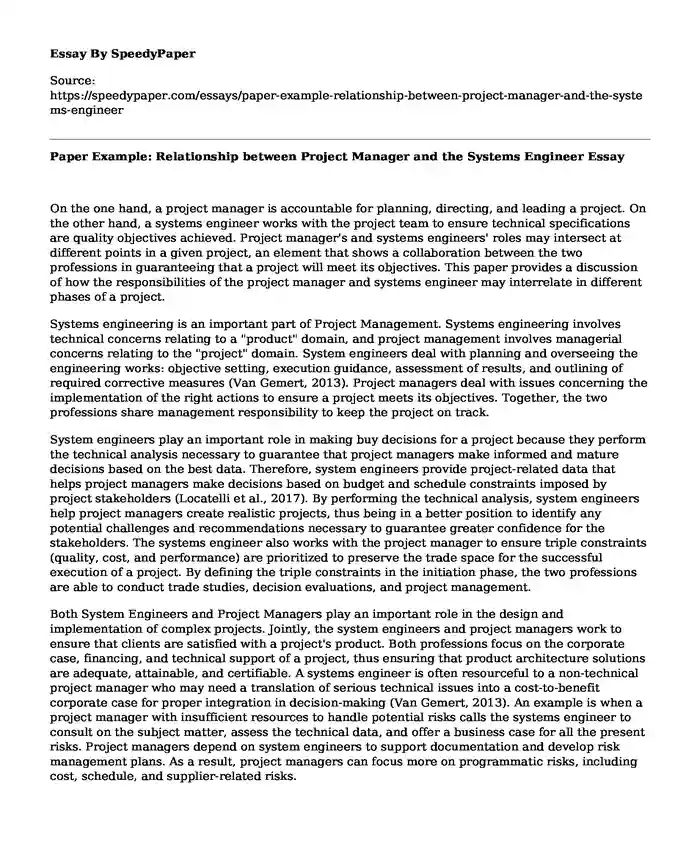
| Type of paper: | Essay |
| Categories: | Project management Engineering |
| Pages: | 3 |
| Wordcount: | 622 words |
On the one hand, a project manager is accountable for planning, directing, and leading a project. On the other hand, a systems engineer works with the project team to ensure technical specifications are quality objectives achieved. Project manager's and systems engineers' roles may intersect at different points in a given project, an element that shows a collaboration between the two professions in guaranteeing that a project will meet its objectives. This paper provides a discussion of how the responsibilities of the project manager and systems engineer may interrelate in different phases of a project.
Systems engineering is an important part of Project Management. Systems engineering involves technical concerns relating to a "product" domain, and project management involves managerial concerns relating to the "project" domain. System engineers deal with planning and overseeing the engineering works: objective setting, execution guidance, assessment of results, and outlining of required corrective measures (Van Gemert, 2013). Project managers deal with issues concerning the implementation of the right actions to ensure a project meets its objectives. Together, the two professions share management responsibility to keep the project on track.
System engineers play an important role in making buy decisions for a project because they perform the technical analysis necessary to guarantee that project managers make informed and mature decisions based on the best data. Therefore, system engineers provide project-related data that helps project managers make decisions based on budget and schedule constraints imposed by project stakeholders (Locatelli et al., 2017). By performing the technical analysis, system engineers help project managers create realistic projects, thus being in a better position to identify any potential challenges and recommendations necessary to guarantee greater confidence for the stakeholders. The systems engineer also works with the project manager to ensure triple constraints (quality, cost, and performance) are prioritized to preserve the trade space for the successful execution of a project. By defining the triple constraints in the initiation phase, the two professions are able to conduct trade studies, decision evaluations, and project management.
Both System Engineers and Project Managers play an important role in the design and implementation of complex projects. Jointly, the system engineers and project managers work to ensure that clients are satisfied with a project's product. Both professions focus on the corporate case, financing, and technical support of a project, thus ensuring that product architecture solutions are adequate, attainable, and certifiable. A systems engineer is often resourceful to a non-technical project manager who may need a translation of serious technical issues into a cost-to-benefit corporate case for proper integration in decision-making (Van Gemert, 2013). An example is when a project manager with insufficient resources to handle potential risks calls the systems engineer to consult on the subject matter, assess the technical data, and offer a business case for all the present risks. Project managers depend on system engineers to support documentation and develop risk management plans. As a result, project managers can focus more on programmatic risks, including cost, schedule, and supplier-related risks.
Conclusion
Systems engineers do not officially report all evolution requirements to the project managers. However, the engineers should be ready to be answerable to any concerns raised by the project manager and keep them updated on significant matters. The relationship between the two professions is based on mutual trust. While the project managers depend on the systems engineers to promptly provide important project-related information, systems engineers should not over-burden the project managers with redundant information that may create confusion and uncertainties on project management's key responsibilities.
References
Locatelli, G., Mancini, M., & Romano, E. (2017). Project manager and systems engineer: a literature-rich reflection on roles and responsibilities. International Journal of Project Organisation and Management, 9(3), 195-216.
Van Gemert, D. (2013). Systems engineering the project. Project Management Institute. https://www.pmi.org/learning/library/systems-engineering-project-5857
Cite this page
Paper Example: Relationship between Project Manager and the Systems Engineer. (2024, Jan 23). Retrieved from https://speedypaper.com/essays/paper-example-relationship-between-project-manager-and-the-systems-engineer
Request Removal
If you are the original author of this essay and no longer wish to have it published on the SpeedyPaper website, please click below to request its removal:
- Free Essay on Mesoamerican Religious Beliefs and Practices
- Free Essay Focusing on Home Depot Supply Strategies
- The 10 Project Management Knowledge Areas - Essay Sample
- Essay Sample on the Flat Earth Theory
- Essay Sample on a Contemporary Healthcare Issue
- Free Essay: What Factors Can Affect Mathematics Achievement in Secondary Education?
- The Effectiveness of Consulting Services Provided - Paper Example
Popular categories




